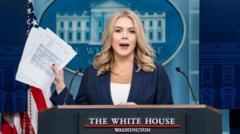In a move to expedite deregulation, President Trump has directed federal agencies to adopt procedures that might clash with existing legal frameworks, potentially facing significant judicial challenges.
Trump’s Bold Approach to Deregulation Faces Legal Roadblocks

Trump’s Bold Approach to Deregulation Faces Legal Roadblocks
The president's executive orders aim to streamline the elimination of regulations, raising eyebrows among legal experts.
April 11, 2025, 1:20 p.m. ET
In a significant shift in regulatory policy, President Trump has instructed ten federal agencies, including the Environmental Protection Agency and the Energy Department, to adopt a streamlined approach for abolishing a range of energy and environmental regulations. The new directive involves the introduction of “sunset” provisions that would cause regulations to lapse automatically by October 2026 unless renewed, with renewals limited to a maximum of five years.
Along with this order, Trump issued another directive aimed at rescinding federal rules that limit water flow in showerheads, stating: “Notice and comment is unnecessary because I am ordering the repeal.” This declaration has prompted astonishment among legal experts, who argue it contradicts established federal law, specifically the 1946 Administrative Procedure Act, which mandates comprehensive public engagement before the repeal or alteration of substantial regulations.
Legal analysts have echoed concerns that these moves could be deemed illegal, with Harvard Law School's Environmental and Energy Law Program director, Jody Freeman, asserting, “On its face, all of this is totally illegal.” The discontent among legal circles raises questions about the administration's commitment to lawful procedure in implementing this aggressive deregulation agenda.
In a significant shift in regulatory policy, President Trump has instructed ten federal agencies, including the Environmental Protection Agency and the Energy Department, to adopt a streamlined approach for abolishing a range of energy and environmental regulations. The new directive involves the introduction of “sunset” provisions that would cause regulations to lapse automatically by October 2026 unless renewed, with renewals limited to a maximum of five years.
Along with this order, Trump issued another directive aimed at rescinding federal rules that limit water flow in showerheads, stating: “Notice and comment is unnecessary because I am ordering the repeal.” This declaration has prompted astonishment among legal experts, who argue it contradicts established federal law, specifically the 1946 Administrative Procedure Act, which mandates comprehensive public engagement before the repeal or alteration of substantial regulations.
Legal analysts have echoed concerns that these moves could be deemed illegal, with Harvard Law School's Environmental and Energy Law Program director, Jody Freeman, asserting, “On its face, all of this is totally illegal.” The discontent among legal circles raises questions about the administration's commitment to lawful procedure in implementing this aggressive deregulation agenda.





















